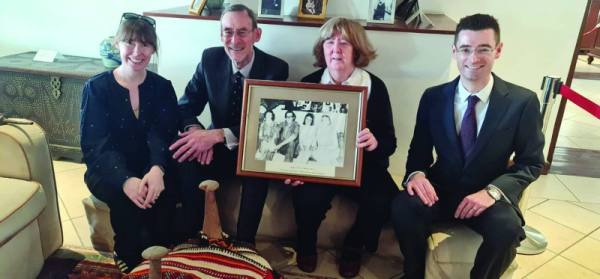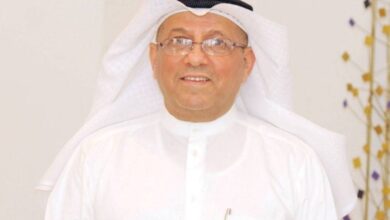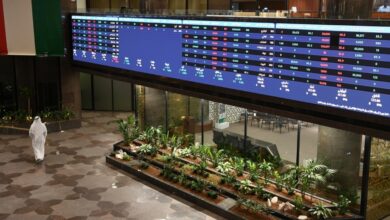
In a heartwarming historical visit filled with nostalgia, the National Library of Kuwait welcomed Penny and her brother Stephen Freeth, alongside their children Elizabeth and Richard, grandchildren of the late Lt. Col. Harold Dickson, who served as the British Political Agent in Kuwait during two critical periods; first between 1929 to 1936 and the second from May to August 1941. Dickson was accompanied during his sojourns in Kuwait by his wife, Violet Dickson, fondly remembered as ‘Umm Saud’, who left her own indelible prints on Kuwait social life.
During their visit, Stephen took his son and daughter to Dickson House, one of Kuwait’s most iconic heritage landmarks, to immerse them in the legacy of their great-grandfather and the family’s life during that era.
In a media interview conducted by Arabic daily Al-Rai the Dickson grandchildren said that their visit was far more than a family trip, it was a tribute to a remarkable couple who contributed to shaping Kuwait’s history. They emphasized that Dickson House is no longer merely a residence but a profound symbol of history, culture, and enduring human connections.
The following are excerpts from the Al-Rai interview:
Asked what made them return to Kuwait with their children, and their impressions on entering the Dickson home, Stephen said: “Kuwait has always been part of our family’s conversation and history. As descendants of Harold Dickson we carry the scent of this past in our memories, but we a;lso wanted to show our children this historical connection themselves. Visiting the Dickson House was a pivotal moment, as it was the place where my grandfather and grandmother lived, and the place where special relationships were born between them and the people of Kuwait.
“I first came to Kuwait in 1953 to visit my grandmother ‘Umm Saud’ and I stayed with her for a year. After that, I visited her for a month in 1970 with my mother Zahra. This was my second visit with my family to Kuwait during the past four years.
“It was an indescribable feeling, to enter the house, we felt as if we were reliving a part of the past. The furniture, the old pictures, and even the smells all tell the story of an era that we did not live in but is present in our collective memory. My grandmother lived here because she loved Kuwait, and she was fluent in the Kuwaiti dialect, earning her the name ‘Umm Saud’. I see that the Kuwaiti people still remember her, and I am happy to see the house transformed into a protected shrine.”
Penny added, “This house is more than just walls; it carries the spirit of the family and the memories of our grandfather and grandmother, as well as the details of the daily life they lived in a community full of generosity and simplicity. We wanted to connect the new generations of the family to this beautiful story.
“When I stood in the place where my grandmother used to sit, I felt as if she was still here. I had never been to Kuwait before, but now I understand why our grandparents loved this place and its people.”
In reply to what he remembers about his first visit to Kuwait back in the 1950, Stephen said: “I used to go to the beach with my grandmother. She had a great relationship with all the fishermen there. I was a teenager who loved seafood, so I asked our cook to make me shrimp. He did, but two days later, when I asked for shrimp again, my grandmother told me that the cook, Mohammed Ali, said if I requested it again, he’d quit because it took him four hours to prepare the dish. My grandmother also used to tell me stories about Kuwait before the discovery of oil.
“My grandfather had great respect for Kuwaitis and their culture, and always tried to build strong relationships with them. As for my grandmother, she was a very popular figure among the people of Kuwait. She learned Arabic and became very close to Kuwaiti women, which earned her the ‘Umm Saud’ nickname.”
Penny continued, “My grandmother was an exceptional person, a Western woman living in Kuwait and adapting to the lifestyle here. She had a great passion for understanding the local culture, which made her hold a special place in the hearts of Kuwaitis.
When asked about their impressions on visiting Kuwait, Dickson’s great-grand-son Richard said he was amazed by the warmth and generosity with which they were met by Kuwaitis everywhere. He added that they were keen to explore the history and learn the stories of their great-grandfather, as it was very important for them to know how their ancestors lived and how they contributed to strengthening the bonds between Britain and Kuwait. “We remember the stories my mother used to tell us about her childhood here, and how proud she was of her relations with Kuwait. We came to this house to feel the scent of the beautiful past, and to see the beautiful old pictures on the walls of the house.
Elizabeth chipped in to say, “We grew up hearing interesting stories about this house and living in Kuwait, as well as about that car in the house. We heard many stories about it, how it was the only one in Kuwait with a white roof and was black, and how our grandmother ‘Umm Saud’ used to drive it around Kuwait.”
In his message to Kuwait, Stephan stressed the importance of preserving heritage and strengthening historical relations between peoples, “Our grandfather and grandmother were living examples of cultural understanding, and we want to continue to pass on this spirit to future generations.”
His sister, Penny added, “We want to thank the people of Kuwait for keeping my grandfather and grandmother’s memory alive in their hearts. This visit has confirmed to us that human bonds are always stronger than time, and that memories can be a bridge to the future.”













